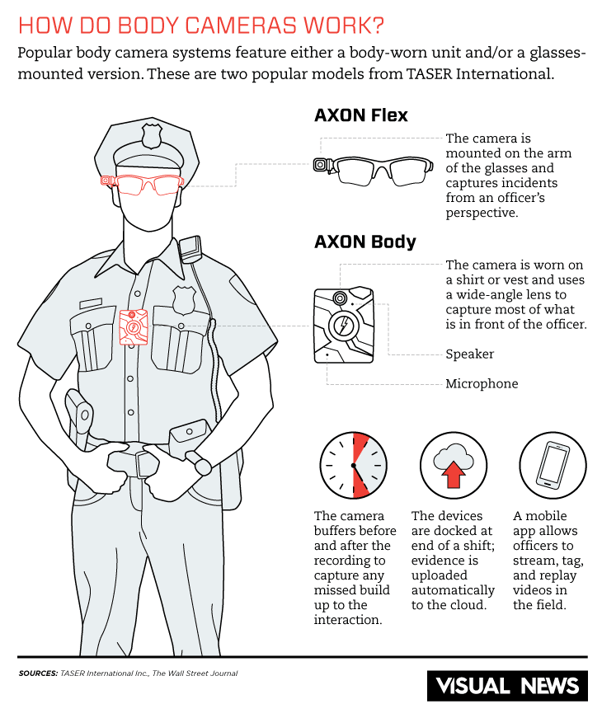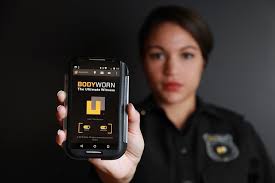Last week in part one of our two-part blog we took a look at the early use of police body cameras and explored a few considerations for police departments rolling out body camera programs. This week we’ll explain how the cameras operate and introduce you to the four main companies that make them.
For brevity’s sake we’ll take a look at the most commonly used police body camera: TASER’s Axon Body.
The Axon Body is clipped onto an officer’s uniform (usually the chest area). Axon constantly records video in thirty second clips, overwriting old video as it records. If an officer wants to record something important, he or she lets Axon know by pressing a button, which will save the video for later — including the thirty second window of footage before and after the important event occurred. When the officer’s shift ends, he or she plugs the Axon into a docking station that transmits all saved recordings to the police department’s servers or to a cloud-based storage service. Axon’s battery life is twelve hours – long enough to last through a shift.

Companies That Make Police Body Cameras
TASER: TASER, (known for the police tool of the same name) is the current market leader with more than 41,000 of its Axon models sold to over 3,500 agencies as of June 2015. The cameras come with a safeguarding feature that prohibits users from deleting video and marks it with a security hash to prove that the video has not been altered. TASER supplies cameras for police agencies in Dallas, Salt Lake City, New Orleans, San Diego, Los Angeles and Tucson.
VieVu: VieVu, a privately held company founded by a former Seattle Police Department SWAT officer, markets their products as made “for cops by cops”. VieVu’s cameras come with software that prevents users from editing or deleting recorded video and are currently being used by more than 4,000 police agencies around the world.
Digital Ally: Digital Ally, headquartered in Kansas, makes body cameras and dashboard cams as well (their patented design integrates the entire camera system into a rearview mirror). Their cameras watermark and time stamp video footage to prohibit anyone from manipulating it. Digital Ally recently fulfilled orders for body cameras from police departments in Michigan, Colorado and New Jersey.
Google: Reminiscent of Robocop, Google Glass is a wearable computing device that provides information to the eye-line of the wearer on a small screen inside of a pair of glasses. The device records video and could also supply the wearer with instant information about a suspect when integrated with facial recognition software. This technology is in its very early stages with regard to police use. The NYPD ran a test program in early 2014 and the Centerville, G.A. police department tested Google Glass earlier this year. Some departments are already concerned about durability, battery life and cost (about $1,500 a pair).
Next Steps
- Sign up for our newsletter to stay up-to-date with the latest industry news
- Follow us on Twitter, Facebook or LinkedIn
- Download our Ultimate Guide to Bulletproof Glass and Bullet Resistant Barriers infographic


